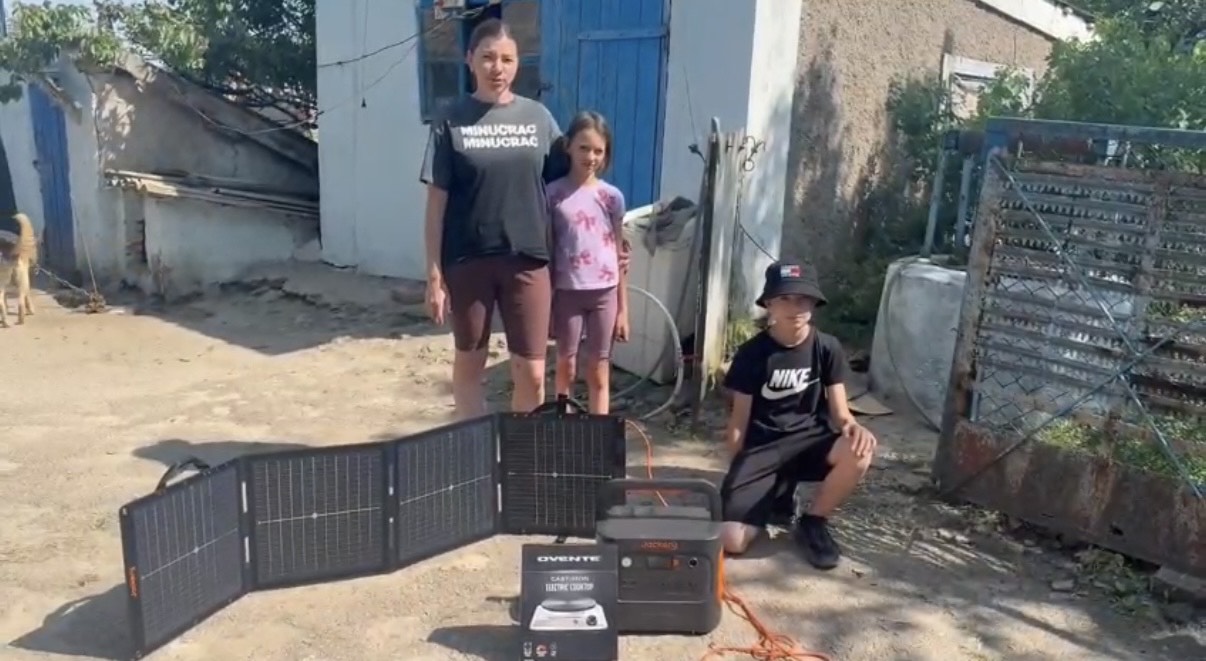There are many compelling reasons to replace fossil fuels with clean, renewable energy sources. Chief among them is to solve the climate change crisis and it is an urgent one. Another is to eliminate toxic air pollution that causes a huge number of human deaths per year around the world. Of course, it would also be extremely helpful to prevent disastrous oil spills.
There’s another use for clean renewable electricity, in this case solar power: humanitarian aid situations. Portable solar power systems can be used in conflict zones for civilians who have no access to electricity or not enough so they can meet their basic daily needs.
In Ukraine, there are a huge number of people in conflict zones or near them who have had their lives greatly disrupted so simply trying to survive on a daily basis can be difficult. To those of us who are safe in other countries, a small solar power kit and an electric cookstove may not sound like much, but for people in great need this technology can be a lifesaver.
The humanitarian organization, Hope for Ukraine, is expanding its solar power and electric cookstove program to help Ukrainians in need to be able to cook food. The solar power can help provide electricity for other needs as well such as lighting.
Yuriy Boyechko, CEO of Hope for Ukraine, answered some questions about the Ukraine energy crisis and about the organization’s solar power and electric cookstove program.
About how many people are near the frontlines and have no electricity?
It’s hard to know the exact number of people, but we are talking about millions of people who live in close proximity to the frontline in the Sumy, Dnipro, Zaporizhia, and Kherson regions. Currently, we have 10,000 families that are on our waiting list to receive solar energy resilience kits.
Are all, or most, of these people gathering firewood to burn in order to cook?
Yes, all of those that live in single family homes use firewood to cook and keep themselves warm.
How do Russian drones detect fire smoke and target people near those fires?
These areas are under constant surveillance of Russian spy drones, so anytime they see smoke from burning firewood, they presume it to be Ukrainian military, and those locations are sent to Russian strike units who hit these areas with attack drones or missiles.
Are Russian drones bombing these people or sending information to the Russian Air Force who send bombers?
They hit these civilian targets because they detect signs of life, and their goal is to completely level these areas so they can keep advancing.
Does your solar power kit have one solar panel and a smoke-free electric cookstove and is that enough solar power?
Yes, the solar kit comes with one 200 W solar panel and an electric cooktop. This solar panel charges the solar generator fully in 8 hours.
How many solar kits have you distributed and how many more will you?
So far, we distributed 80 of them, and our goal is another 220 by the end of this year.
How many people in the frontlines are energy insecure?
We estimate over 1 million families (around 3 million people) live near the frontline experiencing extreme energy insecurity.
How many in all of Ukraine?
Around 10 million.
How is solar power helping the energy insecure in conflict zones?
Our units give families a way to prepare hot meals without burning wood, keep them warm during winter by connecting electric heaters to it, and allow children to continue remote learning because they can charge their school-provided laptops.
Are solar power arrays also being targeted and destroyed?
No, these units are portable, so it’s hard to detect them.
Sign up for CleanTechnica’s Weekly Substack for Zach and Scott’s in-depth analyses and high level summaries, sign up for our daily newsletter, and follow us on Google News!
Whether you have solar power or not, please complete our latest solar power survey.
Have a tip for CleanTechnica? Want to advertise? Want to suggest a guest for our CleanTech Talk podcast? Contact us here.
Sign up for our daily newsletter for 15 new cleantech stories a day. Or sign up for our weekly one on top stories of the week if daily is too frequent.
CleanTechnica uses affiliate links. See our policy here.
CleanTechnica’s Comment Policy

